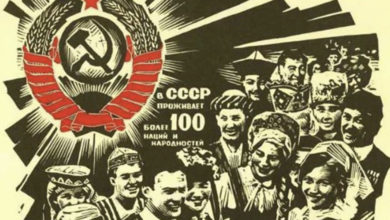Recently a video emerged of Senator Bernie Sanders, at that time Mayor of Burlington, Vermont, reporting back from a sister-city delegation to the Soviet Union. That he went on the trip itself is not in any way news. This fact emerged during the 2016 Democratic Primary contest and has been the subject of a number of articles since. It is now being revived as part of the increasingly vicious wave of red-baiting targeting Sanders as he consolidates his status as the campaign’s front runner.
This excerpt from Sanders’ reportback is being aggressively circulated by the rightwing because it features Sanders and his wife Jane (who was also on the delegation) relating some of the things they found impressive about the USSR. And of course the establishment of the Democratic Party is also engaged in spreading anti-communist smears targeting Sanders.
In particular, Bernie and Jane Sanders lauded the childcare arrangements and the extensive sports programs provided to the entire population free of charge.
Rightwingers are attempting to spread faux outrage over anything positive at all being said about the Soviet Union, which in their false characterization was just one long, dark night filled with terror and misery. Unfortunately for angry Republicans this isn’t likely to be the damning anti-Sanders propaganda they are hoping for because, throughout its existence, even enemies of the Soviet Union often pointed out the exact same elements as bright spots.
A brief snapshot of Soviet life
In 1974 the New York Times wrote a piece about Soviet childcare with the headline: “In Soviet Union, Day Care is the Norm.” Among other things the article noted: “The Soviet network of nurseries (for ages of 6 months to 3 years) and kindergartens (4 to 6) is far more extensive than in most Western countries, including the United States.”
In 1988 the Christian Science Monitor noted that kindergarten was “considered a key link in the social infrastructure by Soviet planners.” One 1971 study of the issue noted: “The 86% increase in child care facilities between 1961 and 1970 is, in itself, four times as large as the total number of places in daycare facilities in the United States.”
In 1957 Sports Illustrated took a trip inside the USSR. The piece noted, among other things:
“Sports are a very big thing in the U.S.S.R. today. In fact, sports are everywhere…the physical fitness ideal is evident in the huge stadiums and sports fields of the big cities, and the numberless more modest but thoroughly efficient installations in smaller towns. And they are not only there—they are used, constantly.”
And also:
“What prompts all this activity? There are many reasons. First, and most important: the government is behind it—a single, solid fact which in the U.S.S.R. obviously means a great deal. Combine this with the considerable amount of leisure time resulting from a universal eight-hour day, a passion for mass activity, and excellent facilities available at no cost, and you have more of the answer.”
A 1982 journal contribution discussing the relationship between mass sport and Olympic sports in the USSR stated that “the system is an impressive affair indeed.”
A Christian Science Monitor article about summer camp in the USSR noted it was an “enormous countrywide network…which handles some 15 million Soviet children each year.” Further the article points out: “Depending on the camp, there are greater or lesser helpings of arts and crafts, nature hikes, and the like. Soviet children genuinely look forward to Pioneer camp.”
Nostalgia for days gone by
This is not to say everything was perfect in the USSR, but, clearly, Sanders hit on true points back in 1989: the Soviet Union had a number of positive features. One other way to assess the truthfulness of his comments is the clear and well-documented nostalgia in Russia for the Soviet era.
In October of 2019 Pew conducted a poll assessing the attitudes of Russians towards the fall of the Soviet Union. Some 63 percent of Russians told Pew that “It is a great misfortune that the Soviet Union no longer exists,” and 71 percent of Russians who lived most of their lives in the USSR felt that way, but, interestingly enough 50 percent of those ages 18-34–who lived, at best, only a short period of time under a Soviet banner–also agreed.
Only 27 percent say the economic situation in Russia is better now than “under Communism.” Fifty-three percent explicitly said it was worse. Only 38 percent think the move to a “market economy” was a good idea. Seventy percent of people surveyed said that the transition had mainly benefited politicians and businesspeople.
Notably, considering Sanders’s comments, only 29 percent of Russians felt education had improved post-Cold War.
The bottom line is: it is absurd that Republicans and some Democrats are attempting to make a big deal because Bernie Sanders once said some positive things about the Soviet Union. For those who value healthcare as a human right, universal child care, full employment and quality mass recreation for all, the USSR and many other current and former socialist countries have much in their histories to discuss, celebrate and remember.





